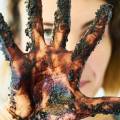OCD & Contamination Fears: Feared Outcomes (Example: HIV/AIDS)

Surface knowledge about OCD rituals and obsessions is of limited utility. Treatment success depends also on understanding subtle differences in feared outcomes.
In my last post, I identified several types of obsessions that are associated with contamination/health-related obsessive-compulsive disorder (OCD). These include the fear of:
- Germs and getting sick.
- Making others sick.
- Developing an incurable illness in the future.
- Experiencing extreme and uncontrollable disgust or distress.
- Other unwanted negative outcomes related to the spread of germs, contaminants, or other agents.
Given the idiosyncratic nature of obsessive-compulsive disorder (OCD), I thought it would be useful to talk a bit more about feared outcomes.
Feared outcomes can be very different for different people, even when you’re dealing with the same surface obsession. Moreover, sometimes the immediate feared outcome (getting sick) differs from the ultimate feared outcome (dying from a disease).
Consider the OCD fear of being infected with HIV. Individuals who experience this health-related OCD obsession often experience distress related to very different feared outcomes.
OCD: Feared Outcomes Related to AIDS/HIV Obsessions
- Many are afraid of death and fear dying from AIDS.
- Others are afraid of pain and discomfort during the years preceding death. They may fear symptoms of the illness or even the side effects of treatment (e.g., nausea).
- Others fear that if they were to contract HIV that they would become severely depressed. It is the thought of a potentially chronic depression that is intolerable.
- Some worry that if they developed AIDS and experienced depression that they would have no option other than to commit suicide. The possibility of killing oneself then fuels moral, religious, or ethical distress. Thoughts of developing AIDS then begin to elicit automatic thoughts of a hopeless moral bind or even the possible threat of damnation (due to committing an “unpardonable sin”).
- Others worry that if they developed AIDS, they might die and leave behind loved ones (e.g., spouse, children) who might have a difficult time providing for themselves.
- Others worry that chronic illness will be a burden on their families. They fear potential guilt or the emotional or financial toll of chronic illness.
- Others fear the social stigma associated with AIDS and worry that when others learn of their illness, they might assume that they are promiscuous or homosexual.
- Others fear that if they die from AIDS, their lives would have been pointless or meaningless. It is the fear of a meaningless existence that makes the thought of contracting HIV so distressing.
- Some fear that if they do contract HIV, they might be responsible for unintentionally infecting others. In these cases, distress is not directly linked to one’s own suffering or death but rather to the potential for accidentally harming innocent people.
Surface knowledge about rituals and obsessions will be of only limited utility in designing an effective treatment for OCD. In order for treatment to be successful, it must be tailored to address the often subtle differences in feared outcomes. These feared outcomes can then be incorporated into exposure and response prevention (ERP) and cognitive restructuring exercises. Moreover, knowledge about feared outcomes can help you detect other, more subtle rituals that maintain the cycle of OCD.

Have long showers because of contamination OCD? Use our ERP shower exposure room to shorten your shower times!
Effective treatment for these feared outcomes will need to address these subtle rituals, as well as more overt rituals like washing or long OCD shower rituals.
Exposures will likely include in vivo exposures (touching “dirty” or contaminated things), imaginal exposure for OCD, and combined imaginal / in vivo exposure.
Join me next time when I talk about why people really do rituals in health-related OCD.
Questions? Comments? What feared outcomes are related to your OCD symptoms? Share below…
Want Updates about New Content?
Follow Me!
Follow @drstevenseay












I no longer know how to shower quickly. It’s never enough and I do not know when to stop. Are there any guidelines?
Hand washing: CDC says 20-30 seconds but I cannot get everything in that time and I am sure I do each area too much. Thoughts?
11 years of fighting demons in TN. I don’t live in FL or MO.